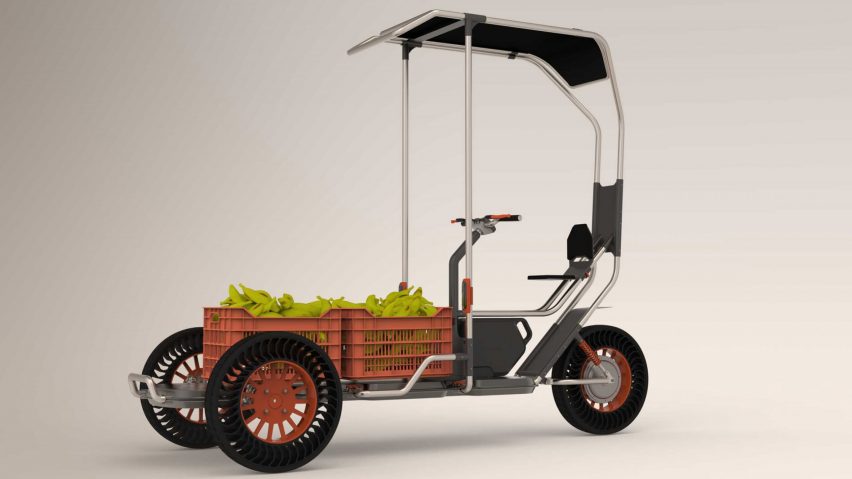Soof Azani and Lir Braverman's proposal for a solar-powered cargo bike that aims to facilitate local deliveries is the latest of 10 visionary transportation projects selected for Dezeen's Future Mobility Competition powered by Arrival.
Called D50, Azani and Braverman's concept aims to combine solar power with micro-mobility in a bid to improve the distribution of goods while reducing carbon emissions.
The vehicle, which is intended for developing countries, is designed for heavy loads to expedite last-mile deliveries for traders and businesses.
The vehicle is topped with a solar roof and features "airless" wheels, which eliminate the risk of flat tyres, are durable and are resistant to various terrain conditions.
Its modular design and easy disassembly means it can be customised and configured to suit the driver's needs depending on the load that needs to be delivered.
The bike is equipped with a removable battery so that it can be protected from theft.
Read more about the proposal below:
D-50
Soof Azani and Lir Braverman
Holon, Israel
Finalist
"Bicycles are being used in many different and unusual ways for travelling, transporting goods or people, etcetera.
"Nowadays, the field of lightweight and electric vehicles is rapidly developing and spreading all over the world, and one of the ways to support and charge these vehicles is by solar energy.
"The new relationship between solar energy and micro-mobility creates a world of new and exciting opportunities for developers.
"D50 is a new means of transportation, with the ability to disassemble and assemble quickly, thus enabling cheap and safe delivery to anywhere in the world.
"The D50 serves as a vehicle designed for heavy loads and thus provides an economic opportunity to various traders and professionals.
"It is a modular vehicle with many connections and anchoring options, thus allowing the owner to customise the car according to his personal needs."
Future Mobility Competition
The Future Mobility Competition is a global design contest that seeks to support emerging talent, bringing radical solutions to solve mobility challenges in cities and, in turn, create true sustainability and empower local communities.
Launched in partnership with electric vehicle company Arrival, the contest asked entrants to identify problems with mobility in their city, or a city they are familiar with, and propose solutions that will improve how people move around their environment.
The contest received over 170 entries from more than 45 different countries around the world.
The entries were assessed by a judging panel comprising Kunlé Adeyemi of architecture, design and urbanism studio NLÉ, Elizabeth Diller of New York studio Diller Scofidio + Renfro, Yves Béhar of Fuseproject, Jeremy Offer and Martina Wierzbicki from Arrival, as well as Marcus Fairs and Cajsa Carlson from Dezeen.
The panel selected 10 proposals as finalists to be published on Dezeen. We are unveiling one finalist a day from 27 June, culminating in the winner being announced on 8 July.
The winner will win the top prize of $25,000, while the runner-up will receive $15,000 and the third-placed entrant will receive $10,000. Each of the seven remaining finalists will receive prize money of $5,000.
Find out more about the Future Mobility Competition ›
See all the finalists revealed so far ›
Partnership content
The Future Mobility Competition powered by Arrival is a partnership between Dezeen and Arrival. Find out more about Dezeen partnership content here.

